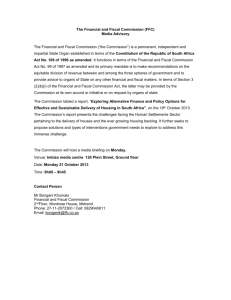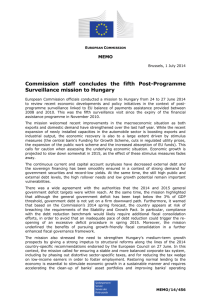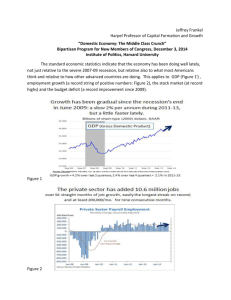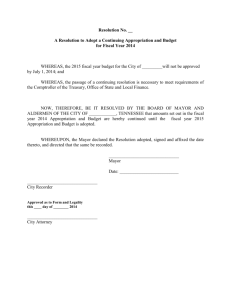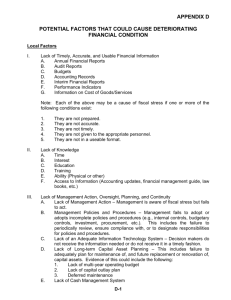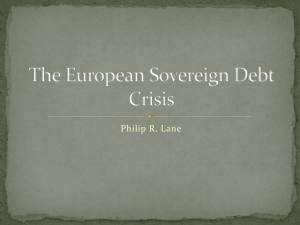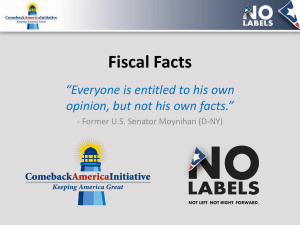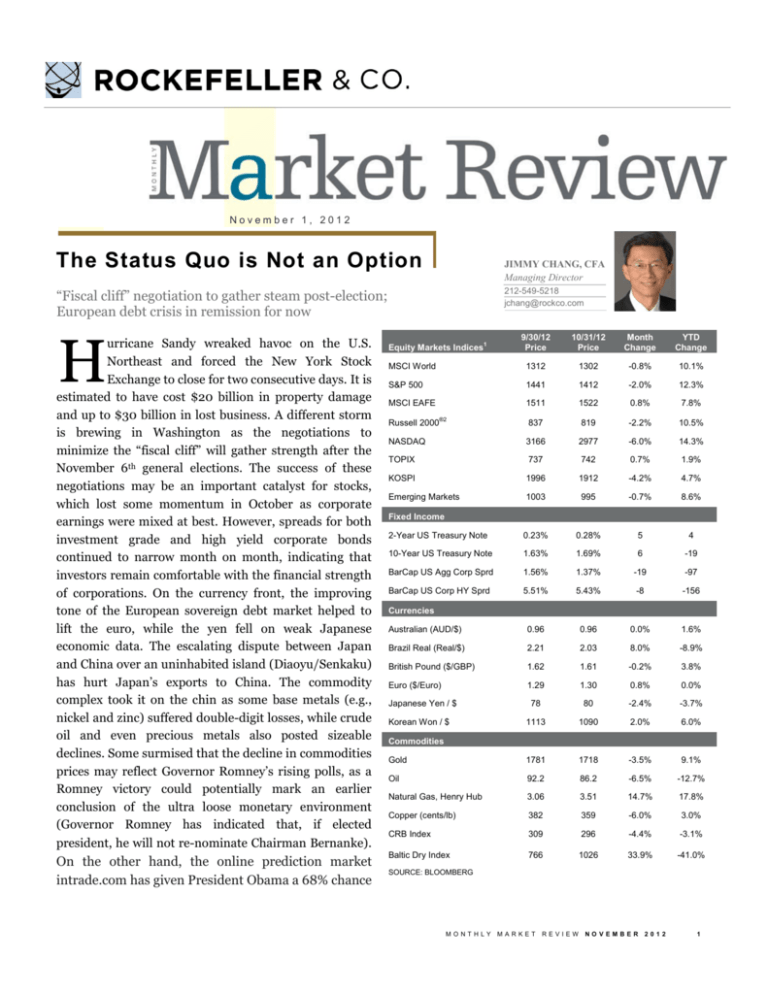
November 1, 2012
The Status Quo is Not an Option
JIMMY CHANG, CFA
Managing Director
“Fiscal cliff” negotiation to gather steam post-election;
European debt crisis in remission for now
H
urricane Sandy wreaked havoc on the U.S.
Northeast and forced the New York Stock
Exchange to close for two consecutive days. It is
estimated to have cost $20 billion in property damage
and up to $30 billion in lost business. A different storm
is brewing in Washington as the negotiations to
minimize the “fiscal cliff” will gather strength after the
November 6th general elections. The success of these
negotiations may be an important catalyst for stocks,
which lost some momentum in October as corporate
earnings were mixed at best. However, spreads for both
investment grade and high yield corporate bonds
continued to narrow month on month, indicating that
investors remain comfortable with the financial strength
of corporations. On the currency front, the improving
tone of the European sovereign debt market helped to
lift the euro, while the yen fell on weak Japanese
economic data. The escalating dispute between Japan
and China over an uninhabited island (Diaoyu/Senkaku)
has hurt Japan’s exports to China. The commodity
complex took it on the chin as some base metals (e.g.,
nickel and zinc) suffered double-digit losses, while crude
oil and even precious metals also posted sizeable
declines. Some surmised that the decline in commodities
prices may reflect Governor Romney’s rising polls, as a
Romney victory could potentially mark an earlier
conclusion of the ultra loose monetary environment
(Governor Romney has indicated that, if elected
president, he will not re-nominate Chairman Bernanke).
On the other hand, the online prediction market
intrade.com has given President Obama a 68% chance
212-549-5218
jchang@rockco.com
9/30/12
Price
10/31/12
Price
Month
Change
YTD
Change
MSCI World
1312
1302
-0.8%
10.1%
S&P 500
1441
1412
-2.0%
12.3%
MSCI EAFE
1511
1522
0.8%
7.8%
Russell 2000®2
837
819
-2.2%
10.5%
NASDAQ
3166
2977
-6.0%
14.3%
Equity Markets Indices1
TOPIX
737
742
0.7%
1.9%
KOSPI
1996
1912
-4.2%
4.7%
Emerging Markets
1003
995
-0.7%
8.6%
2-Year US Treasury Note
0.23%
0.28%
5
4
10-Year US Treasury Note
1.63%
1.69%
6
-19
BarCap US Agg Corp Sprd
1.56%
1.37%
-19
-97
BarCap US Corp HY Sprd
5.51%
5.43%
-8
-156
Australian (AUD/$)
0.96
0.96
0.0%
1.6%
Brazil Real (Real/$)
2.21
2.03
8.0%
-8.9%
British Pound ($/GBP)
1.62
1.61
-0.2%
3.8%
Euro ($/Euro)
1.29
1.30
0.8%
0.0%
78
80
-2.4%
-3.7%
1113
1090
2.0%
6.0%
Gold
1781
1718
-3.5%
9.1%
Oil
92.2
86.2
-6.5%
-12.7%
Natural Gas, Henry Hub
3.06
3.51
14.7%
17.8%
Copper (cents/lb)
382
359
-6.0%
3.0%
CRB Index
309
296
-4.4%
-3.1%
Baltic Dry Index
766
1026
33.9%
-41.0%
Fixed Income
Currencies
Japanese Yen / $
Korean Won / $
Commodities
SOURCE: BLOOMBERG
MONTHLY
MARKET
REVIEW
NOVEMBER
2012
1
of getting re-elected. In any case, the suspense will be
lifted fairly soon, unless the race is too close to call in
a key battleground state, which could then lead to
recounts and even legal challenges.
The Status Quo is Not an Option
By the time some of you start reading this newsletter, the
U.S. presidential election will be over. Regardless of who
emerges as the occupant of the White House for the next
four years, there will be little time to savor the victory as
the attention will quickly shift to the contentious
negotiation to avoid the fiscal cliff. There is a growing
concern that Congress may let the country go off the
fiscal cliff as representatives on both sides of the aisle dig
in their heels on the issue of tax increases for the
wealthy. Should Congress fail to reach a deal by the end
of 2012, federal tax rates will revert to pre-Bush levels,
and there will be across-the-board budget cuts to nearly
all federal government discretionary spending, including
defense. The prospect of a failed negotiation would
therefore create much market anxiety and volatility.
More importantly, the U.S. government needs to
demonstrate to the world that it is serious about tackling
its fiscal challenges, as the status quo is simply not a
credible option. To wit, in fiscal year 2011 the federal
government collected $2.2 trillion in tax revenue, but
spent $3.6 trillion. That means for fiscal 2011 the U.S.
federal government only took in 60 cents of revenue for
each dollar it spent.
On the campaign trail one may get the impression that
all is well if we could just make the rich pay their fair
share of tax. Well, the so-called “Buffett Rule” (30% tax
rate on individuals making more than $1 million a year)
would raise an extra $5 billion to $16 billion a year,
depending on one’s assumptions. The $16 billion upperend estimate would close the budget gap by a whopping
1.1%!
How about cutting non-essential programs such as the
$430 million annual grant to the Corporation of Public
Broadcasting? Well, there are not enough Big Birds when
80% of the federal budget in fiscal year 2011 was taken
up by social security (20%), Medicare/Medicaid/CHIP
We suspect that even the most recalcitrant ideologues do
(21%),
safety net programs (13%), defense-related (20%),
not intend to plunge the U.S. economy into a deep
and interest on debt (6%). The fact
recession. The risk is that our
is that the massive budget gap will
representatives
in
Congress
There are not enough Big
not be materially narrowed until
misjudge their political opponents’
these
big
ticket
items
are
Birds when 80% of the federal
resolve in a game of chicken. An
restructured
and
serious
revenueeasier way out for now may be
budget in fiscal year 2011 was
raising
tax
reforms
are
another temporary stopgap measure
taken
up
by
social
security,
implemented.
It
will
inevitably
lead
to kick the can down the road for a
to a period of shared pain, but the
few more months and buy more time
Medicare, Medicaid,
long-term effect on the economy
for a bipartisan deal, especially if
Children’s
Healthcare
could be so positive that investors
there is a new president. Such a
would be willing to look past shortmove would produce continued
Insurance Program (CHIP),
term setbacks.
policy uncertainty which has the
safety net programs, defense-
effect of discouraging new business
Europe on the Mend
related, and interest on debt.
investments and hiring. More
While the impending fiscal cliff may
cynically, Congress could let Bush
serve
as
a
catalyst
to force the U.S. to embark on
tax cuts expire at the end of 2012, then heroically work
structural reforms to address its fiscal challenges
out a deal to “cut” taxes for the middle class. The new
starting in 2013, the European Union has been working
federal tax rates could be higher than where rates are
hard to maintain status quo. After all, the EU was just
today, but they would nevertheless allow politicians to
awarded the Nobel Peace Prize. To its credit, the effort to
claim credit for fighting for the middle class.
maintain status quo has been quite successful, at least
MONTHLY
MARKET
REVIEW
NOVEMBER
2012
2
for now. Much credit should go to the European Central
Bank President Mario Draghi. His bond buying scheme,
the Outright Monetary Transactions (OMT) program
(ECB buying sovereign bonds of a country that officially
requests assistance), has driven peripheral European
countries’ borrowing costs significantly lower even
though Spain has yet to officially request a bailout. On
October 30, 2012, Italy was able to sell 10-year bonds at
an average yield of 4.92%, which is a huge relief from the
7% level in late 2011. Spain’s 10-year bond yield has also
retreated from the July 2012 peak of 7.5% to 5.6% at the
end of October 2012. Achieving affordable interest rates
to roll over maturing debt is a critical first step in setting
Spain and Italy on the path of fiscal sustainability.
Long-suffering Greece has also seen its bonds mounting
a huge rally with the Greece’s 10-year bond yield falling
from early-March 2012’s 30.6% to 17.3% at the end of
October 2012. German Chancellor Merkel had made a
symbolic visit to Greece in early October 2012, signaling
her intention to help Greece to stay in the Eurozone. One
can argue that Chancellor Merkel will work hard to
minimize the chance of a “Grexit” that could trigger
unintended consequences and even another global
financial crisis. After all, she will be up for re-election in
less than a year. This kinder, gentler Chancellor Merkel
on European sovereign debt issues could go a long way
in changing the market and economic dynamics. It is
reported that the Troika (European Union, European
Central Bank, and International Monetary Fund) is
considering granting Greece a two-year extension to
meet its bailout targets. It may even allow further debt
restructuring. Chancellor Merkel also sided with Mario
Draghi in supporting OMT over the objection of her
handpicked Bundesbank president Jens Weidmann.
With the European sovereign debt crisis seemingly going
into remission for the time being, the European problem
has been reduced to a less intractable recession, which is
more of a cyclical than secular issue. There is also
renewed debate over how much latitude countries facing
economic challenges should have in implementing
austerity, which some believe to be worsening the debtto-GDP dynamic. In short, there may be hope for the
European Union after all, even though the structural
issues (e.g., big disparity in competitiveness between the
North and the South) remain unresolved. Of course, a lot
will depend on a Germany that says more Jå than Nein.
Mixed Earnings Season
The corporate earnings reporting season for the third
quarter of 2012 was mixed at best. Weakness in Europe
and slower growth in China were two major drags on
sales and earnings growth. The artificially low interest
rates engineered by the Federal Reserve also squeezed
many U.S. banks’ net interest margins. There were also a
number of technology product transitions – Windows 8,
iPhone 5, iPad mini – that temporarily disrupted sales.
The looming fiscal cliff may also have curtailed business
investment. One also cannot rule out the possibility of a
mild recession in early 2013, as some government
stimulus schemes will soon expire.
However, there is a silver lining on the horizon, as we
believe the market will likely look past short-term
weakness if there is a credible plan from Washington
D.C. to put America on the path of fiscal sustainability.
The U.S. housing market also appears to be in the midst
of a nascent recovery. With Europe’s sovereign debt
crisis under control and a new generation of leaders
taking over in China, one could argue that these regions
may be poised for a cyclical uptick in the not so distant
future. Interestingly, the common thread across these
regions is that so much depends on policymakers doing
the right things, or avoiding egregious mistakes.
MONTHLY
MARKET
REVIEW
NOVEMBER
2012
3
Rockefeller & Co., Inc. locations:
New York
10 Rockefeller Plaza
3rd Floor
New York, NY 10020
212-549-5100
Rockefeller Trust Company, N.A.
10 Rockefeller Plaza
3rd Floor
New York, NY 10020
212-549-5100
Washington DC
900 17th Street NW
Suite 603
Washington, DC 20006
202-719-3000
The Rockefeller Trust Company (Delaware)
1201 N Market Street
Suite 1401
Wilmington, DE 19801
302-498-6000
Rockit® Solutions, LLC
201 Tresser Boulevard
Suite 200
Stamford, CT 06902
866-497-9111
www.rockitco.com
Boston
99 High Street
17th Floor
Boston, MA 02110
617-375-3300
www.rockco.com
This paper is provided for informational purposes only. The views expressed are of one of Rockefeller &Co., Inc.’s senior portfolio
managers as of a particular point in time and are subject to change without notice. The information and opinions presented herein
have been obtained from, or are based on, sources believed by Rockefeller & Co., Inc. to be reliable, but Rockefeller &Co., Inc.
makes no representation as to their accuracy or completeness. Actual events or results may differ materially from those reflected
or contemplated herein. Although the information provided is carefully reviewed, Rockefeller &Co., Inc. cannot be held
responsible for any direct or incidental loss resulting from applying any of the information provided. Past performance is no
guarantee of future results and no investment strategy can guarantee profit or protection against losses. These materials may not
be reproduced or distributed without Rockefeller& Co., Inc.’s prior written consent.
1
Index pricing information does not reflect dividend income, withholding taxes, commissions, or fees that would be incurred by an
investor pursuing the index return.
2
®
The Russell 2000 Index is a registered trademark of the Frank Russell Company. Frank Russell Company is the owner of the
copyright relating to this index and is the source of its performance value.
Copyright 2012 © Rockefeller & Co., Inc. All Rights Reserved.
MONTHLY
MARKET
REVIEW
NOVEMBER
2012
4

